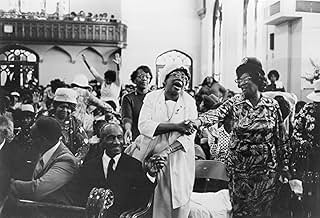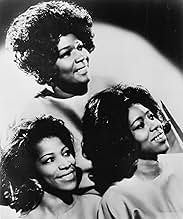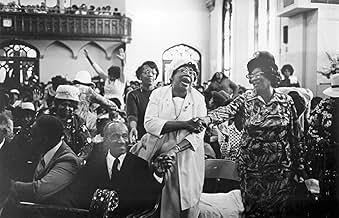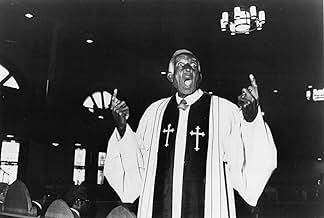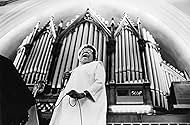Documentary about the American gospel music scene, focusing on two of the movement's pioneering forces, Thomas A. Dorsey and Willie May Ford Smith.Documentary about the American gospel music scene, focusing on two of the movement's pioneering forces, Thomas A. Dorsey and Willie May Ford Smith.Documentary about the American gospel music scene, focusing on two of the movement's pioneering forces, Thomas A. Dorsey and Willie May Ford Smith.
- Awards
- 1 win & 1 nomination total
Willie Mae Ford Smith
- Self
- (as Willie May Ford Smith)
Billie Barrett GreenBey
- Self
- (as Billie Greenbey)
Rodessa Barrett Porter
- Self
- (as Rhodessa Porter)
Frank Campbell
- Self
- (as Rev. Frank W. Campbell)
Melvin Smotherson
- Self
- (as Rev. Melvin Smotherson)
Featured reviews
March 30, 1983 "Say Amen, Somebody" Four stars
Movies / Roger Ebert "Say Amen, Somebody" is the most joyful movie I've seen in a very long time. It is also one of the best musicals and one of the most interesting documentaries. And it's also a terrific good time. The movie is about gospel music, and it's filled with gospel music. It's sung by some of the pioneers of modern gospel, who are now in their 70s and 80s, and it's sung by some of the rising younger stars, and it's sung by choirs of kids. It's sung in churches and around the dining room table; with orchestras and a capella; by an old man named Thomas A. Dorsey in front of thousands of people, and by Dorsey standing all by himself in his own backyard. The music in "Say Amen, Somebody" is as exciting and uplifting as any music I've ever heard on film. The people in this movie are something, too. The filmmaker, a young New Yorker named George T. Nierenberg, starts by introducing us to two pioneers of modern gospel: Mother Willie May Ford Smith, who is 79, and Professor Dorsey, who is 83. She was one of the first gospel soloists; he is known as the Father of Gospel Music. The film opens at tributes to the two of them - Mother Smith in a St. Louis church, Dorsey at a Houston convention - and then Nierenberg cuts back and forth between their memories, their families, their music and the music sung in tribute to them by younger performers. That keeps the movie from seeming too much like the wrong kind of documentary - the kind that feels like an educational film and is filled with boring lists of dates and places. "Say Amen, Somebody" never stops moving, and even the dates and places are open to controversy (there's a hilarious sequence in which Dorsey and Mother Smith disagree very pointedly over exactly which of them convened the first gospel convention). What's amazing in all of the musical sequences is the quality of the sound. A lot of documentaries use "available sound," picked up by microphones more appropriate for the television news. This movie's concerts are miked by up to eight microphones, and the Dolby system is used to produce full stereo sound that really rocks the theater. One of the phenomenons during screenings of this film is the tendency of the audience to get into the act. Willie May Ford Smith comes across in this movie as an extraordinary woman, spiritual, filled with love and power. Dorsey and his longtime business manager, Sallie Martin, come across at first as a little crusty, but then there's a remarkable scene where they sing along, softly, with one of Dorsey's old records. By the end of the film, when the ailing Dorsey insists on walking under his own steam to the front of the gospel convention in Houston, and leading the delegates in a hymn, we have come to see his strength and humanity. Just in case Smith and Dorsey seem too noble, the film uses a lot of mighty soul music as counterpoint, particularly in the scenes shot during a tribute to Mother Smith at a St. Louis Baptist church. We see Delois Barrett Campbell and the Barrett Sisters, a Chicago-based trio who have enormous musical energy; the O'Neal Twins, Edward and Edgar, whose "Jesus Dropped the Charges" is a show-stopper; Zella Jackson Price, a younger singer who turns to Mother Smith for advice; the Interfaith Choir, and lots of other singers. "Say Amen, Somebody" is the kind of movie that isn't made very often, because it takes an unusual combination of skills. The filmmaker has to be able to identify and find his subjects, win their confidence, follow them around, and then also find the technical skill to really capture what makes them special. Nierenberg's achievement here is a masterpiece of research, diligence and direction. But his work would be meaningless if the movie didn't convey the spirit of the people in it, and "Say Amen, Somebody" does that with great and mighty joy. This is a great experience.
Movies / Roger Ebert "Say Amen, Somebody" is the most joyful movie I've seen in a very long time. It is also one of the best musicals and one of the most interesting documentaries. And it's also a terrific good time. The movie is about gospel music, and it's filled with gospel music. It's sung by some of the pioneers of modern gospel, who are now in their 70s and 80s, and it's sung by some of the rising younger stars, and it's sung by choirs of kids. It's sung in churches and around the dining room table; with orchestras and a capella; by an old man named Thomas A. Dorsey in front of thousands of people, and by Dorsey standing all by himself in his own backyard. The music in "Say Amen, Somebody" is as exciting and uplifting as any music I've ever heard on film. The people in this movie are something, too. The filmmaker, a young New Yorker named George T. Nierenberg, starts by introducing us to two pioneers of modern gospel: Mother Willie May Ford Smith, who is 79, and Professor Dorsey, who is 83. She was one of the first gospel soloists; he is known as the Father of Gospel Music. The film opens at tributes to the two of them - Mother Smith in a St. Louis church, Dorsey at a Houston convention - and then Nierenberg cuts back and forth between their memories, their families, their music and the music sung in tribute to them by younger performers. That keeps the movie from seeming too much like the wrong kind of documentary - the kind that feels like an educational film and is filled with boring lists of dates and places. "Say Amen, Somebody" never stops moving, and even the dates and places are open to controversy (there's a hilarious sequence in which Dorsey and Mother Smith disagree very pointedly over exactly which of them convened the first gospel convention). What's amazing in all of the musical sequences is the quality of the sound. A lot of documentaries use "available sound," picked up by microphones more appropriate for the television news. This movie's concerts are miked by up to eight microphones, and the Dolby system is used to produce full stereo sound that really rocks the theater. One of the phenomenons during screenings of this film is the tendency of the audience to get into the act. Willie May Ford Smith comes across in this movie as an extraordinary woman, spiritual, filled with love and power. Dorsey and his longtime business manager, Sallie Martin, come across at first as a little crusty, but then there's a remarkable scene where they sing along, softly, with one of Dorsey's old records. By the end of the film, when the ailing Dorsey insists on walking under his own steam to the front of the gospel convention in Houston, and leading the delegates in a hymn, we have come to see his strength and humanity. Just in case Smith and Dorsey seem too noble, the film uses a lot of mighty soul music as counterpoint, particularly in the scenes shot during a tribute to Mother Smith at a St. Louis Baptist church. We see Delois Barrett Campbell and the Barrett Sisters, a Chicago-based trio who have enormous musical energy; the O'Neal Twins, Edward and Edgar, whose "Jesus Dropped the Charges" is a show-stopper; Zella Jackson Price, a younger singer who turns to Mother Smith for advice; the Interfaith Choir, and lots of other singers. "Say Amen, Somebody" is the kind of movie that isn't made very often, because it takes an unusual combination of skills. The filmmaker has to be able to identify and find his subjects, win their confidence, follow them around, and then also find the technical skill to really capture what makes them special. Nierenberg's achievement here is a masterpiece of research, diligence and direction. But his work would be meaningless if the movie didn't convey the spirit of the people in it, and "Say Amen, Somebody" does that with great and mighty joy. This is a great experience.
Documentaries really don't get much better than this. It's a look behind the scenes at a world few (particularly white) viewers get to see unless it appears on a religious TV show if you like in a town with a black population. We see the lives and performances of two gospel greats, Willie May Ford Smith and Thomas Dorsey. The documentary follows their lives from the early days and leads up to a big conference when the two dynamic subjects share an auditorium. The documentary shows the joy of gospel music in an age of cynicism. We feel the purity of expression here and see very little of the commercial trappings we see in so much of organized religion. People are singing because it feels good! People are responding to these singers because it feels good! People are saying amen because it feels good! Recommended as an antidote to the blahs.
Features outstanding performances by Willie May Ford Smith, Thomas A. Dorsey, Sallie Martin, the Barrett Sisters, Edward and Edgar O'Neal and Zella Jackson Price. For anyone interested in real Gospel and not some choreographed Hollywood version, look no further.
This film is simply a celebration of Gospel music as sung by child choirs, as sung by its youngest rising stars and its oldest pioneers, as sung in churches and in kitchens, with musical accompaniment as well as a capella. The careers of Willie May Ford Smith and Thomas Dorsey provide background to explore the development of Gospel through the 20th Century.
We are so lucky to have this record of Thomas A. Dorsey (July 1, 1899 - January 23, 1993) on film. It shows the Father of Gospel Music to be a commanding choir director even at 83 years of age.
A sincere, exuberant experience.
This film is simply a celebration of Gospel music as sung by child choirs, as sung by its youngest rising stars and its oldest pioneers, as sung in churches and in kitchens, with musical accompaniment as well as a capella. The careers of Willie May Ford Smith and Thomas Dorsey provide background to explore the development of Gospel through the 20th Century.
We are so lucky to have this record of Thomas A. Dorsey (July 1, 1899 - January 23, 1993) on film. It shows the Father of Gospel Music to be a commanding choir director even at 83 years of age.
A sincere, exuberant experience.
Never have I responded so thoroughly to people in a documentary. I initially became curious about it because of Roger Ebert who rated it so highly.
Now I have it in my collection and whenever I am feeling down, I watch it. In addition to Willie Mae Ford Smith and Thomas A. Dorsey, I love all of the other singers too. In an era when it is possible to feel numb about life, this film and its vivid people help you to process pain and sadness. What survivors! How I would like to meet all of these people. Some of these people are not conventionally pretty, but, oh my! they help you feel again. It is so moving to hear their reminiscences when many are shown later in their lives.
So sadly, many of them are no longer with us. We are all a little poorer without them. That's why we can be so thankful that this film was able to capture what we might have missed. What a terribly sad end to the life of Sallie Martin!
God bless mother Smith and Thomas Dorsey.
We are all richer for them.
Now I have it in my collection and whenever I am feeling down, I watch it. In addition to Willie Mae Ford Smith and Thomas A. Dorsey, I love all of the other singers too. In an era when it is possible to feel numb about life, this film and its vivid people help you to process pain and sadness. What survivors! How I would like to meet all of these people. Some of these people are not conventionally pretty, but, oh my! they help you feel again. It is so moving to hear their reminiscences when many are shown later in their lives.
So sadly, many of them are no longer with us. We are all a little poorer without them. That's why we can be so thankful that this film was able to capture what we might have missed. What a terribly sad end to the life of Sallie Martin!
God bless mother Smith and Thomas Dorsey.
We are all richer for them.
10RLee414
I first saw this movie on Bravo or A&E and was instantly captivated. I found it a year or so later on VHS and almost wore the tape out. I showed it to as many of my friends and family who would watch it. I am elated to finally see it released on DVD with bonus material and an accompanying soundtrack CD. This is my favorite movie/documentary of all time, bar none. It inspires me, and moves me. People don't sing like that anymore. Mother Willie May Ford Smith is absolutely a joy to listen to and watch. All of the persons featured are amazing. I just wish I could have heard Mother Smith in her prime. Mr. Dorsey is the Father of Gospel and I loved watching him sing and talk. This is Gospel 101. Everyone who aspires to be a Gospel singer should watch this. Everyone who loves history/music should watch this. It is a Master's Class in performance. Enjoy.
Did you know
- TriviaFilm Critic Roger Ebert listed this as the 8th best film of 1983.
- ConnectionsFeatured in Siskel & Ebert & the Movies: Crix Pick Prez Flix (1993)
Details
Box office
- Gross US & Canada
- $1,108,299
- Gross worldwide
- $1,108,299
Contribute to this page
Suggest an edit or add missing content


